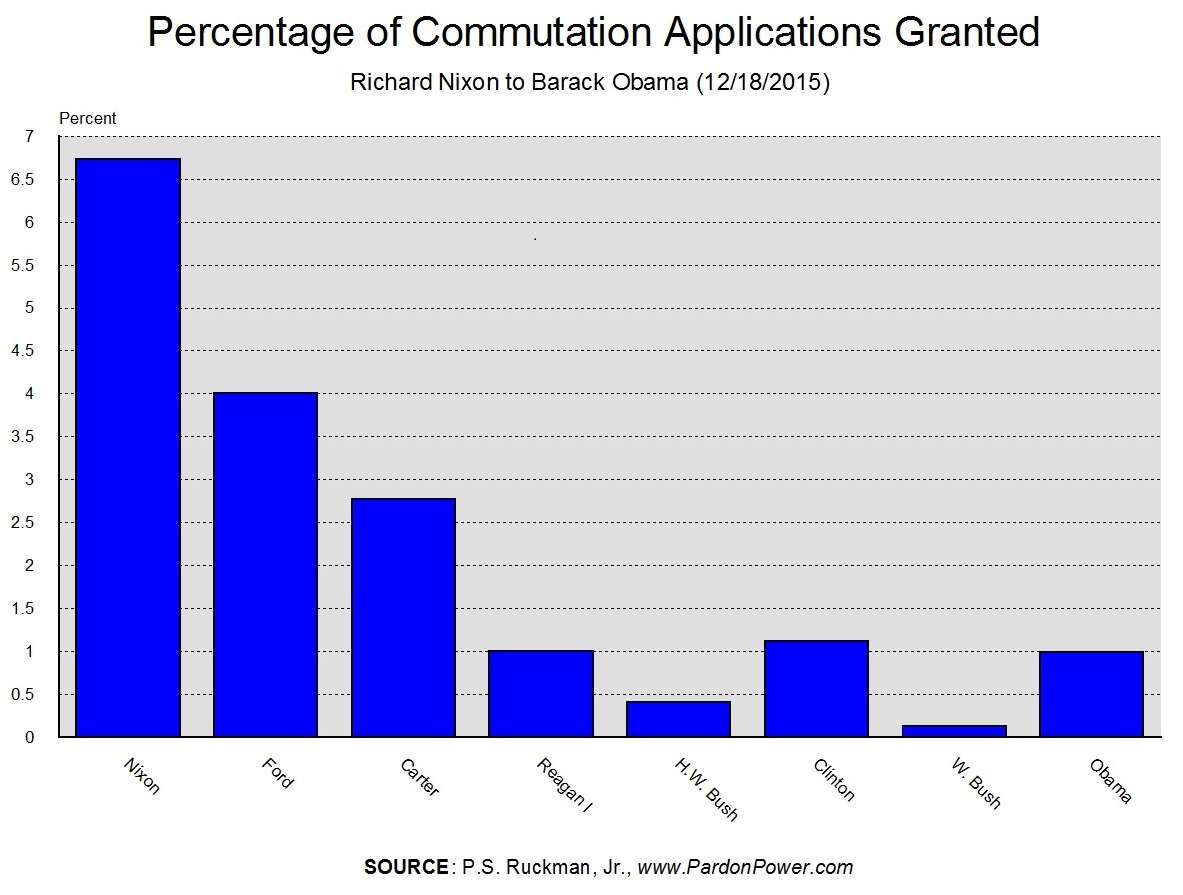Obama Frees Sharanda Jones and 94 Other Prisoners Serving Draconian Sentences
Obama's commutation record looks good in absolute numbers but paltry as a percentage of petitions.

Last Friday, President Obama issued 95 commutations, more than doubling his total so far. Obama has now shortened more sentences than any president since Lyndon Johnson. In fact, he has shortened almost as many sentences as Richard Nixon, Gerald Ford, Jimmy Carter, Ronald Reagan, George H.W. Bush, Bill Clinton, and George W. Bush combined: 184 vs. 199. That's a pretty striking improvement for a president who granted only one commutation in his first term. But since Obama has received a lot more applications for shorter sentences that his predecessors did, his record looks much less impressive if you consider commutations as a percentage of petitions. And unless Obama picks up his pace a lot, it looks like he will fall far short of issuing the "thousands" of commutations that an unnamed "senior administration official" last year said might be seen by the end of his administration.
A large majority of the prisoners who received commutations on Friday—64 out of 95—are crack cocaine offenders. There's a good reason for that. After years of complaints about penalties that arbitrarily treated people caught with the smoked form of cocaine much more severely than people caught with the snorted form, Congress substantially shortened crack sentences in 2010. But it did not make the changes retroactive. Thousands of people therefore continue to serve sentences that almost everyone now agrees are too long.
The rest of the prisoners in this latest batch of commutations were convicted of offenses involving methamphetamine (10), cocaine powder (eight), marijuana (five), cocaine and heroin (one), unspecified controlled substances (five), gun possession by a felon (one), and bank robbery (one). The shortened penalties included 40 life sentences, which Obama changed to terms ranging from nine to 25 years. Twelve of the prisoners were released on Friday. The rest are to be freed on April 16.
The commutation recipients include seven prisoners whose cases have been highlighted by Families Against Mandatory Minimums. Among them are Sharanda Jones, a first-time offender who received a life sentence in 1999 for transporting crack from Houston to a Dallas suburb, and Sandra Avery, a Floridian who received a life sentence in 2007 for possessing 50 grams of crack (less than two ounces) after prosecutors sought an enhanced penalty based on three prior convictions for possessing small amounts of crack that were together worth $100.
"American presidents have had the power to show mercy since the founding of our Republic," says FAMM President Julie Stewart. "President Obama is the first president in decades to use it as the founders intended. For that reason, we commend him for showing more mercy than his predecessors. But his work is not done. Timothy Tyler, Weldon Angelos, Melissa Trigg, and far too many others are still serving excessively long sentences that should be commuted as well." Tyler got a life sentence for mailing LSD to a government informant. Angelos, a first-time offender, got a 55-year mandatory minimum for three small-time marijuana transactions, totaling a pound and a half, because he allegedly possessed a gun at the time of the sales. Trigg, also a first-time offender, got 15 years for selling meth with her boyfriend in Missouri.
Clemency Project 2014, a joint effort by FAMM, the American Bar Association, the American Civil Liberties Union, the Federal Public and Community Defenders, and the National Association of Criminal Defense Lawyers (NACDL), says Friday's batch of commutations included 27 applicants recommended by the project's lawyers. The project, which also took credit for recommending four of the 46 prisoners whose sentences Obama shortened last July, was formed last year after the Justice Department's signaled a new openness to commutation petitions. The DOJ says it is especially interested in petitions from "non-violent, low-level offenders" who have served at least 10 years of a sentence that probably would have been shorter under current law, "do not have a significant criminal history," have "demonstrated good conduct in prison," and have no "significant ties to large-scale criminal organizations, gangs or cartels."
The Clemency Project has been trying to identify prisoners who meet the DOJ's criteria. "We take President Obama at his word that there is no ceiling on the number of commutations he will grant before leaving office," says NACDL Executive Director Norman Reimer. "And so while we are grateful for every single commutation, there are many hundreds more who deserve relief. We urge the President to confound the skeptics by making 2016 an historic year for clemency grants." Obama has received a total of about 18,700 commutation petitions, half of which are still pending.

While Obama compares favorably to his seven immediate predecessors in terms of the number of commutations he has granted, that is not true for the percentage of petitions he has granted. P.S. Ruckman Jr., a clemency expert at Rock Valley College in Rockford, Illinois, notes that Obama has granted about 1 percent of applications for shorter sentences, compared to almost 7 percent for Nixon, 4 percent for Ford, and almost 3 percent for Carter. Measured by this rate, Obama looks about as good as Reagan and Clinton, although better than either of the Bushes.
Ruckman points out that Obama's pardons (which clear people's records, typically long after they have completed their sentences) remain paltry, even in absolute terms, compared to his recent predecessors'. Counting the two pardons issued on Friday, Obama so far has granted 66, less (in most cases, a lot less) than his seven immediate predecessors. According to Ruckman's numbers, Obama has issued fewer total acts of clemency than all but two other presidents who served two complete terms.
Ruckman also faults Obama for continuing the dubious tradition of announcing clemency actions near Christmas:
First, December pardoning sends the signal that the pardon power is an afterthought, something to consider—maybe—just before the year closes out. This impression certainly seems to fit the Obama administration, which has done precious little pardoning for seven years. It is also easy enough to imagine such decision making as rushed, indefensibly casual and/or lacking the kind of careful deliberation that is warranted. Justice, however, should be a year-round, serious concern of a president (and a Department of Justice in an executive branch) constitutionally lodged in a system of checks and balances. If there is no checking, there will be no balance.
Second, December pardoning signals the possibility of a kind of alternate scenario: that clemency decisions are, actually, made throughout the year, but the White House simply sits on applications until December…for whatever reason. So, the President decides someone deserves a pardon or commutation of sentence, in January, but nothing is actually done for 11 months. They just sit in prison for another 11 months. Or they live without restoration of their civil rights for another 11 months. That is more than lazy, or irresponsible. It is a despicable practice…
Third, December pardoning suggests to the general public that pardons are something like "gifts" given to persons who may or may not actually deserve them. That is too bad, because we have no problem assuming most recipients of clemency in this day and age are more than deserving. Why should a cloud of suspicion / disrespect be cast over them? Of course, the "gift" idea is exacerbated by long periods of time without pardoning. Observers more easily wonder—and rightly—"why these people?"
Ruckman wishes presidents would follow an "early and often" clemency pattern that would treat this power with the seriousness it deserves and avoid the doubts aroused by concentrating pardons and commutations toward the end of a year, the end of a term, or the end of an administration.


Show Comments (24)